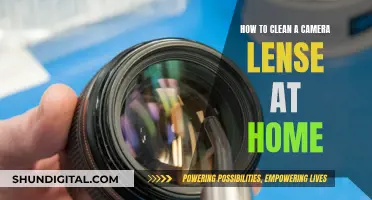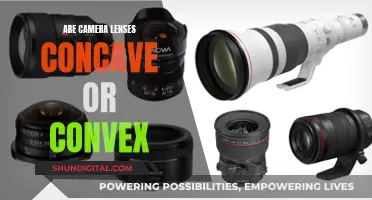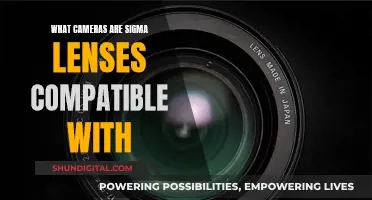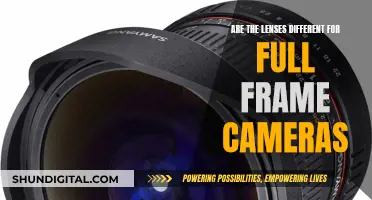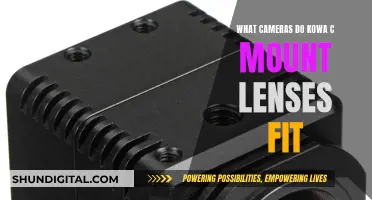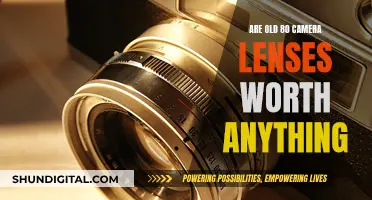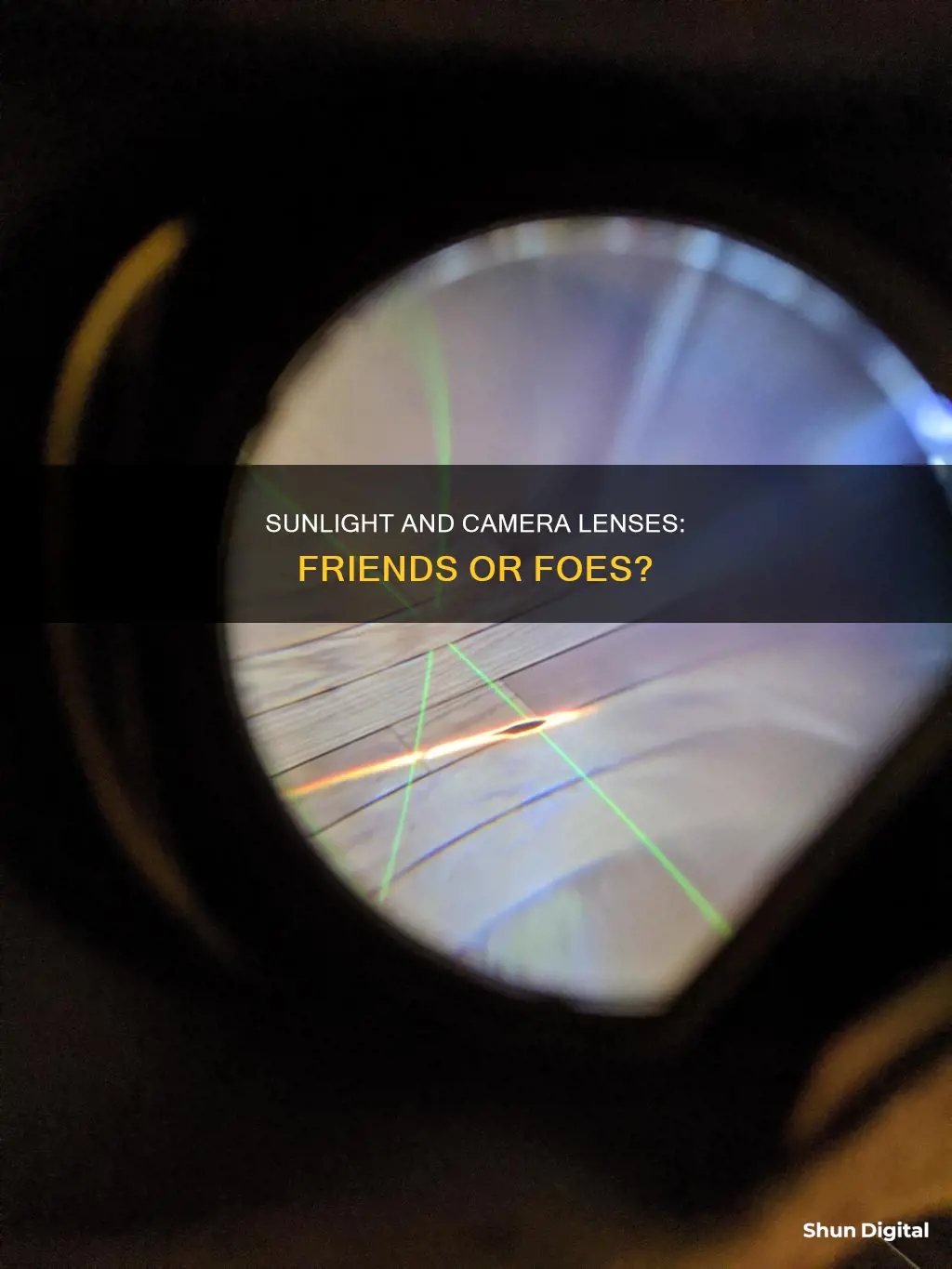
Sunlight can damage camera lenses and sensors, especially when the sun is at its peak and not when it's rising or setting. The damage can range from temporary blinding of the sensor to the complete melting of the camera's internal components. The sun's rays can also harm your eyes, so it's important to exercise caution when taking photos of the sun.
| Characteristics | Values |
|---|---|
| Can the sun damage camera lenses? | Yes |
| What type of cameras are at risk? | Point-and-shoot cameras are at a higher risk of damage than digital SLRs. |
| What are the risks to the user? | Looking at the sun through a camera can damage the user's eyes. |
| How can the risks be mitigated? | Use a solar filter or UV coating; avoid looking at the sun in the middle of the day; avoid pointing the camera directly at the sun for long periods of time. |
What You'll Learn

Pointing a camera at the sun can damage your eyes
Pointing your camera at the sun can damage your eyes and your camera. The sun emits a lot of energy, and when focused through a camera lens, it can act like a magnifying glass, burning the camera's internals and damaging your retinas.
Digital SLRs have a mirror in the viewfinder that covers up the sensor and redirects sunlight away from it and through the viewfinder. However, when you take a picture, the mirror moves out of the way, exposing the sensor to the sun's rays. Therefore, it is crucial never to look through the viewfinder when pointing your camera directly at the sun, as you will only be damaging your eyes without the mirror in place.
The shutter speed also plays a role in determining the amount of sun exposure. Point-and-shoot cameras typically keep the shutter open the entire time they are in use, continuously exposing the sensor, unlike digital SLRs. As a result, if you point your point-and-shoot camera at the sun for an extended period, you will likely damage it.
A simple rule of thumb is that if something is so bright that it hurts your eyes, it will probably also damage your camera. Therefore, it is recommended to avoid looking directly at the sun, especially at midday, and to use common sense to protect your eyes and your camera.
Additionally, when photographing the sun, it is essential to use a solar filter to protect your camera and your eyes. Looking at the sun without proper eye protection can cause permanent eye damage.
Lens Thread Compatibility: A Universal Camera Feature?
You may want to see also

The sun's rays can damage the camera's sensor
The sun's rays can indeed damage a camera's sensor. Here's how:
The sun emits a vast amount of energy, and when focused through a camera lens, it can burn out the camera's image sensor. This is especially true if the camera is a point-and-shoot model, as these cameras keep the shutter open the entire time they are in use, and there is no mirror to redirect the sun's rays away from the sensor. As a result, the image sensor and the screen on the back of the camera are linked, and if you point your camera at the sun for an extended period, you risk damaging the sensor.
Digital SLRs, on the other hand, have a mirror in the viewfinder that covers up the sensitive equipment most of the time and redirects the sun's rays away from the sensor. However, when you take a picture, the mirror moves, exposing the sensor to the sun's rays. Therefore, even with a digital SLR, you should avoid taking pictures of the sun, especially with a narrow angle where the sun would appear bigger in the frame. Long exposures of the sun can cause permanent damage to your camera's sensor.
The intensity of the sun's rays also depends on its position in the sky. When the sun is low on the horizon, such as during sunrise or sunset, it is safer to point your camera at the sun as there is more of the Earth's atmosphere to absorb the sun's energy. However, when the sun is high in the sky, its rays are more intense, and the risk of damaging your camera's sensor is higher.
To protect your camera's sensor from damage, avoid pointing your camera directly at the sun, especially for extended periods. If you must include the sun in your frame, use a solar filter to reduce the amount of light entering your camera. Additionally, be mindful of your own eye safety and never look at the sun through your camera's viewfinder, as this can cause permanent damage to your eyes.
EF-S Lenses: Full-Frame Camera Compatibility Explored
You may want to see also

The sun's rays can damage the camera's shutter curtains
The sun's rays can indeed damage a camera's shutter curtains. The sun's ultraviolet rays are responsible for the fading of curtains and other fabrics. When it comes to cameras, the sun's rays can act as a magnifying glass, focusing the sun's intensity and burning out the camera's internals. This includes the camera's shutter curtains, which are at risk when shooting directly at the sun.
To protect your camera from damage, avoid pointing the lens directly at the sun, especially for long exposures. Additionally, use a UV-blocking filter or a lens hood to reduce the amount of sunlight reaching the camera. Keep in mind that the sun's rays are most intense when it is high in the sky, so taking photos during sunrise or sunset is generally safer.
It is also important to note that looking at the sun through your camera's viewfinder can damage your eyes, so always prioritize your safety when photographing the sun.
Action Cameras: Fisheye Lenses and Their Uses
You may want to see also

The sun's rays can damage the camera's AF sensors
The sun's rays can damage a camera's AF sensors. Here's how:
The sun emits a lot of energy, and when focused through a camera lens, it can burn the camera's internal components, including the AF sensors. This is similar to how a magnifying glass can focus sunlight to create a laser that can burn things. While a single photograph of the sun is unlikely to cause damage, long exposures or pointing the lens directly at the sun for extended periods can be harmful.
Digital SLRs are generally safer than point-and-shoot cameras because they have a mirror that redirects sunlight away from the sensor and through the viewfinder. However, when a picture is taken, the mirror moves, exposing the sensor to the sun's rays. Point-and-shoot cameras, on the other hand, keep the shutter open continuously, potentially damaging the sensor if the camera is pointed at the sun for too long.
To minimise the risk of damage to AF sensors and other camera components, avoid pointing the camera directly at the sun for prolonged periods, especially with telephoto lenses. Additionally, using proper solar filters and shorter exposures can help prevent damage when photographing the sun.
How Eclipse Affects Camera Lenses and Photography
You may want to see also

The sun's rays can damage the camera's mirror box
The sun's rays can indeed damage a camera's mirror box. Here's how:
The sun emits a lot of energy, and when focused through a camera lens, it can burn the camera's internals, including the mirror box. This is similar to how a magnifying glass can be used to focus the sun's rays to burn things. While digital SLRs have a mirror that covers and protects the sensor most of the time, point-and-shoot cameras do not have this protection, leaving their sensors vulnerable.
Additionally, the sun's rays can cause the thin metal shutter blades to sag or twist due to intense heat, resulting in permanent damage. This is what happened to the Canon EOS 7D Mark II camera in the example provided. The photographer left the camera outside in direct sunlight for a few hours, resulting in damage to the mirror box that cost around £350 to repair.
To avoid such damage, it is recommended to never leave your camera unattended in direct sunlight, and when taking pictures of the sun, minimise the time the lens is pointed directly at it, especially around noon when the sun is at its highest and most intense.
Lens Compatibility: Understanding Camera Lens Interchangeability
You may want to see also
Frequently asked questions
Yes, the sun can damage your camera lens and sensor. Taking direct photos of the sun can destroy your camera, not to mention your eyes. The lens will act as a magnifier and multiply the sun's intensity onto your camera's internals.
A quick picture of the sun is unlikely to damage your camera. However, it is not recommended as it may cause temporary sensor blindness, resulting in overexposed images.
It is generally safe to take pictures of the sun with a digital SLR as these cameras have a mirror that covers up the sensitive equipment and redirects the sun's light. However, you should still be cautious and avoid looking at the sun through the viewfinder.
Taking pictures of the sunset or sunrise is generally safe as the sun is less powerful when it is low on the horizon. However, it is still important to use common sense and avoid looking directly at the sun through your camera's viewfinder.


